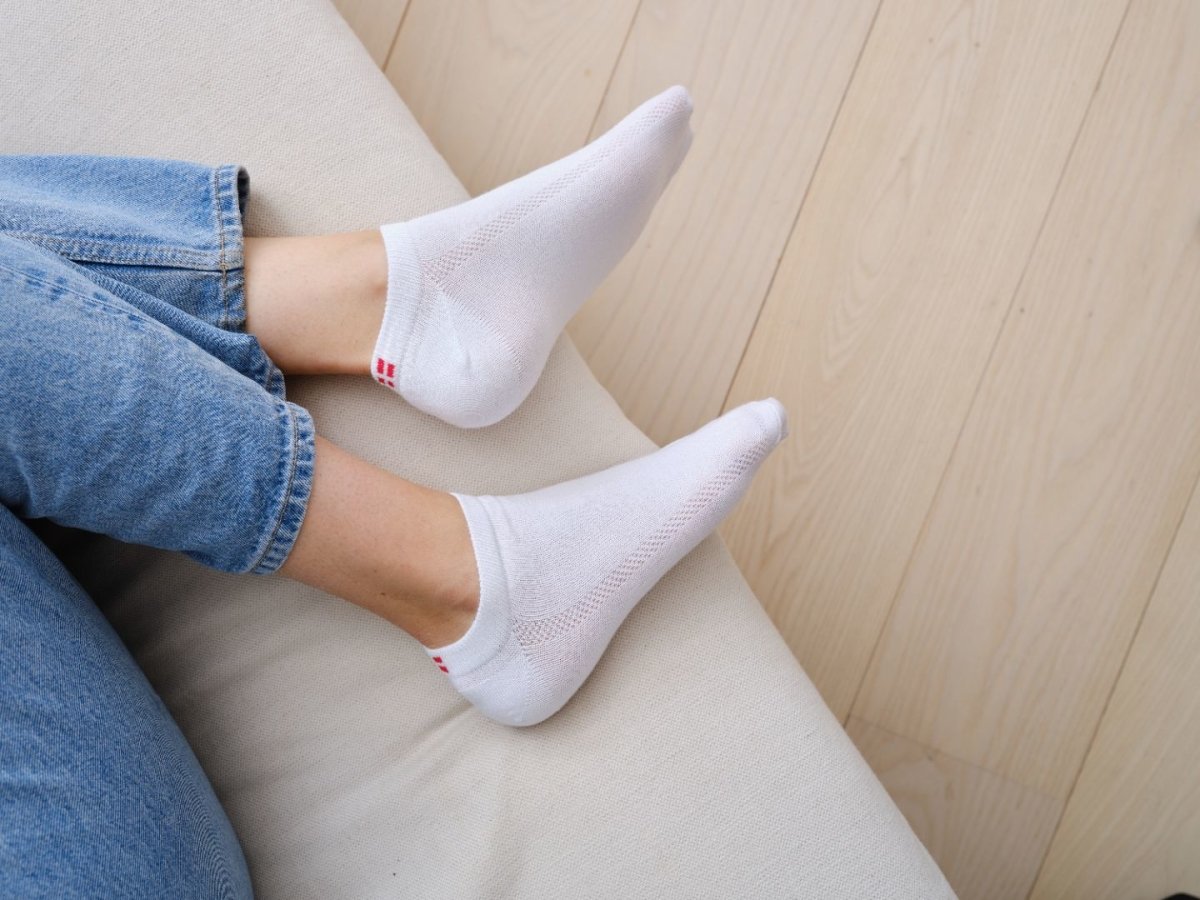TABLE OF CONTENTS
The Daily Dilemma of Sock Selection
The Material Showdown: Bamboo vs Merino vs Cotton
Bamboo: A Silky-Soft and Sustainable Choice
Merino Wool: A Warm and Breathable Option
Cotton: A Versatile and Comfortable Classic
Making Your Decision: Factors to Consider
Stepping into Comfort and Style
THE DAILY DILEMMA OF SOCK SELECTION
Everyday socks are an essential part of our wardrobes, providing us with comfort, support, and style. With a variety of materials to choose from, it can be challenging to determine which type of sock is best for your daily needs. In this article, we'll compare the pros and cons of bamboo, merino wool, and cotton socks to help you make an informed decision. We'll cover everything from sock features to lengths and everything in between, so you can make an informed decision on your perfect pair.
THE MATERIAL SHOWDOWN: BAMBOO VS MERINO VS COTTON
When choosing everyday socks, the material plays a crucial role in determining comfort, breathability, and durability. Let's take a closer look at the unique characteristics of bamboo, merino wool, and cotton materials.
BAMBOO: A SILKY-SOFT AND SUSTAINABLE CHOICE
Bamboo is an increasingly popular material for socks, offering both eco-friendly benefits and luxurious comfort. Bamboo fibers are derived from the fast-growing bamboo plant, requiring less water and fewer pesticides than traditional crops. Some advantages of bamboo socks include:
- Softness: Bamboo fibers are known for their silky texture, providing a luxurious feel in styles such as bamboo dress socks, bamboo no show socks, and bamboo knee high socks.
- Moisture-wicking: Bamboo is highly absorbent, effectively wicking away moisture to keep your feet dry throughout the day.
- Antibacterial properties: Bamboo possesses natural antibacterial and antifungal properties, reducing odor and promoting foot health.
MERINO WOOL: A WARM AND BREATHABLE OPTION
Merino wool is a popular choice for everyday socks due to its exceptional warmth and breathability. Derived from the merino sheep, this natural fiber is ideal for both cold and warm weather, effectively regulating temperature and wicking away moisture. Key benefits of merino wool socks include:
- Temperature regulation: Merino wool socks, including merino wool dress socks, provide comfort in various weather conditions thanks to their temperature-regulating capabilities.
- Moisture-wicking: The moisture-wicking properties of merino wool help to keep your feet dry and comfortable throughout the day.
- Odor resistance: Merino wool is naturally antibacterial, reducing odor-causing bacteria.
- Durability: Despite its softness, merino wool is a strong and durable material, able to withstand regular wear and washing.
COTTON: A VERSATILE AND COMFORTABLE CLASSIC
Cotton is a classic choice for everyday socks, known for its softness and breathability. Organic cotton, grown without the use of harmful pesticides and chemicals, is an eco-friendly alternative to conventional cotton. Some advantages of cotton socks include:
- Softness: Cotton, including organic cotton, is renowned for its soft and gentle texture, making it comfortable for all-day wear in styles such as cotton dress socks, cotton no show socks, and cotton compression socks.
- Breathability: The breathable nature of cotton helps to keep your feet cool and dry throughout the day.
- Durability: Cotton is a durable material that can withstand regular wear and washing.
- Hypoallergenic: Organic cotton is less likely to cause skin irritation, making it a suitable option for those with sensitive skin.
MAKING YOUR DECISION: FACTORS TO CONSIDER
When choosing your perfect everyday socks, consider the following factors:
- Climate: Consider the weather conditions in your region and select a material that offers appropriate temperature regulation, such as merino wool for fluctuating temperatures or bamboo and cotton for warmer climates.
- Skin sensitivity: If you have sensitive skin or allergies, opt for hypoallergenic materials like organic cotton or bamboo to minimize irritation.
- Activity level: Think about your daily activities and choose a material that provides the appropriate level of support and comfort. For example, organic cotton compression socks may be ideal for individuals who are on their feet all day, while bamboo no show socks might be perfect for casual outings.
- Sock length: The length of your socks can impact both style and function. For a discreet look or low-cut shoes, opt for no show or low-cut socks. Knee-high bamboo socks can be a stylish choice for wearing with suits, while compression socks or diabetic crew socks provide additional support and improved blood circulation for activities that require prolonged standing.
- Environmental impact: If you're passionate about supporting sustainable practices, consider choosing organic cotton or bamboo socks, both of which have lower environmental footprints than traditional textiles.
- Personal preferences: Ultimately, the best material and sock length for your everyday socks will depend on your personal preferences in terms of comfort, style, and sustainability. Don't be afraid to experiment with different materials and styles, to find the perfect fit for your needs.
STEPPING INTO COMFORT IN STYLE
Selecting the perfect everyday socks can be a daunting task, but understanding the key differences between bamboo, merino wool, and cotton materials, as well as the importance of sock length, can help you make an informed decision. By considering factors such as climate, skin sensitivity, activity level, and personal preferences, you'll be well on your way to finding the ideal pair of socks to keep you comfortable and stylish every day. So, go ahead and explore the world of socks – your feet will thank you!







IS KETO DIET GOOD FOR RUNNERS AND ENDURANCE ATHLETES?
HOW CROSS TRAINING CAN TAKE YOUR FITNESS TO THE NEXT LEVEL